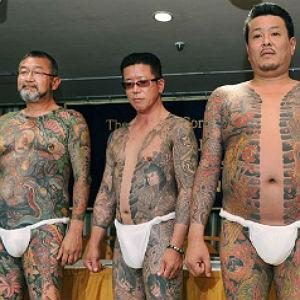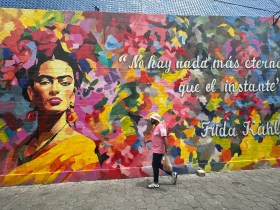Tattoo artist Horiyoshi III knew the prejudice he was facing when he decided to embark on a career as a tattoo artist. Unlike the popular adoption of tattoos in the West, most of Japan still views tattoos as a symbol of the yakuza criminal underworld, whose members bore the same full body “suit” tattoos that III himself creates.
But this negative interpretation of his art hasn’t stopped III from continuing to pursue what he loves. He says he gains great inspiration from Hokusai, an artist who is renowned for his woodblock prints of a Mount Fuji tsunami.
“But I am also influenced by other Japanese artists,” he said.
“And of course I do not exactly reproduce their works: I have to adapt their designs to the bodies on which I work.”
His profession has earned him a string of regular customers, including 52-year-old former gym teacher Asada Yoshi, whose body is covered in tattoos based on Japanese mythology.
“On the right leg, you see a koi (Japanese carp) jumping and on the left leg a creature — half dragon and half koi — and then on the back I designed a massive dragon,” the artist said.
“It refers to an ancient legend in which the carp turns into a dragon after it swam against a waterfall.”
He is also becoming a source of inspiration for some, including his German-born apprentice Alexander Reinke, who hopes to become a tattooist himself one day. Reinke believes that Ill’s tattoos are unique in their singularity, which, unlike popular Western tattoos, present their own narrative.
“The biggest difference is that tattoos in the West are created to underline a person’s individuality,” he said.
“They want to make a statement or remember something they are a really big fan of. But in Japan some groups get tattoos not to underline their individuality because individuality is not so important in Japan, it’s the group that is important.”
Discrimination against tattooed people in Japan is rampant, with many people being denied entry into various venues including hot springs and fitness centres. Recently, the mayor of Osaka even forced city employees to fill out a survey to reveal whether or not they have a tattoo.
“Tattoos have a bad image everywhere, but particularly in Japan they are associated with violence and yakuza, even if that is a simplistic view,” Ill said.
“This image is still stuck in peoples’ minds: tattoo equals criminal, criminal equals yakuza. People are now scared of tattoos.”
Ill himself used to be a member of the yakuza before he decided to leave behind his life of crime and become a tattoo artist. And despite the shady past of the tattoo and its creator, Ill continues to hope that his tattoos will help end the discrimination that tattooed people presently face in Japan.





